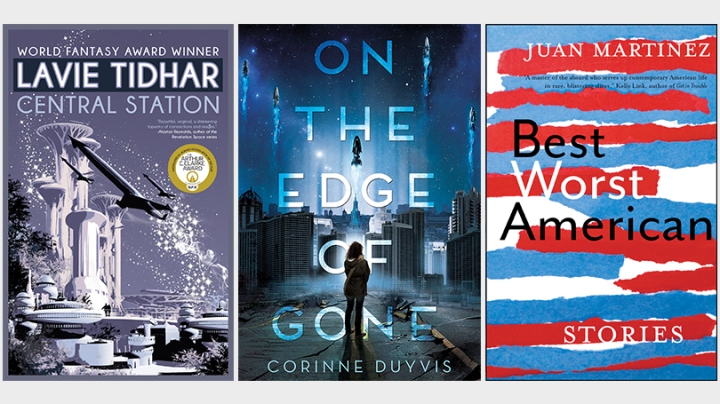A Tel Aviv that is home to a liminal space between human, robot, and digital beings; an Amsterdam on the edge of a meteoric collapse; and talking plants and ghosts—these are fictional worlds invented by authors Lavie Tidhar, Corinne Duyvis, and Juan Martinez. Their books Central Station, On the Edge of Gone, and Best Worst American are the winners of the inaugural Neukom Institute Literary Arts Awards, a global prize that honors works of speculative fiction.
Traveling from their homes in London, Amsterdam, and Chicago, Tidhar, Duyvis, and Martinez will be on campus Monday, Oct. 1, for the award’s first-ever prize ceremony honoring literary authors. In addition to receiving recognition, the authors will participate in a panel discussion about speculative fiction starting at 4 p.m. in Moore Hall’s Filene Auditorium.
Works of speculative fiction, or “spec fic,” incorporate elements of dystopian novels, science fiction, and fantasy. The literary genre includes masterworks like George Orwell’s 1984, Margaret Atwood’s The Handmaid’s Tale, and Isaac Asimov’s I, Robot.
“Much of speculative fiction is dark, ironic, and satirical,” says awards organizer Dan Rockmore, associate dean for the sciences, professor of mathematics and computer science, and director of the Neukom Institute for Computational Science. “My intention is to highlight this genre, and also to bring what I feel is needed attention to the important role that the arts play in helping us understand both the power and the potential dangers of technology and more generally, explorations of the future. At the end of the day, speculative fiction is a nexus of creativity derived from the powerful combination of science and art, science and narrative.”
Rockmore hopes the awards will encourage others to think about interdisciplinary issues posed by speculative fiction and to consider how the humanities and the sciences intersect.
“I do believe that Dartmouth, as a leader in the liberal arts, is the right place to be having an event that features this kind of creative work, because this program does show the power of bringing multiple disciplines and open minds together to articulate and address the challenges and opportunities of the future,” says Rockmore. “I think it’s important that Dartmouth bring these writers to campus to give both students and faculty the opportunity to meet these great writers, hear their ideas, and ask them questions.”
Before the awards ceremony, Rockmore plans to visit Professor of Spanish and Comparative Literature Rebecca Biron’s “Humanities I” class to solicit her students’ questions for the panelists. The students will also attend the ceremony to hear from the authors themselves.
Rockmore notes that although all three winning books are classified as spec fic, the authors represent a broad range within the genre, from young adult literature to short stories to a novel that closely resembles fantasy. This year’s program also recognized playwright Jessica Andrewartha, who received her award at a reading of her play at Dartmouth’s VoxFest and will return to the Upper Valley for a second reading at Northern Stage in White River Junction, Vt., this winter.
Joining the three authors on the panel will be Maria Dahvana Headley, the New York-based author of The Mere Wife, a retelling of the classic Beowulf. Headley, who served as the principal judge for the book awards, believes that the books chosen by the Neukom awards “are not just entertainment, they are relevant as a means of changing the world.”
The event is free and open to the public. After the discussion, the authors will receive their awards and then mingle with attendees at a reception from 5 to 6 p.m. in the Moore Hall lobby, where their books will be available.
Information about the authors and their work is on display in an exhibit near the circulation desk in Baker-Berry Library.
Julie Bonette can be reached at Julie.Bonette@Dartmouth.edu.
